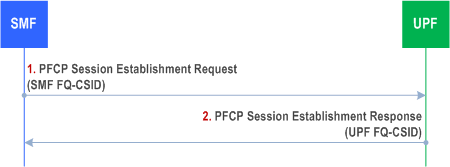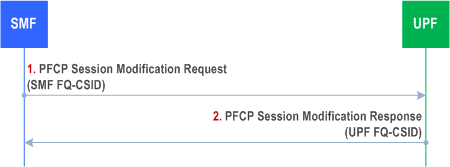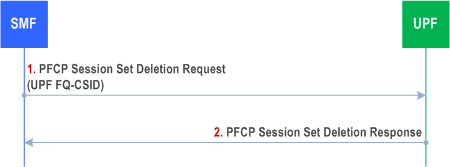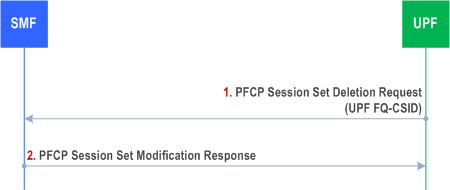Content for TS 23.527 Word version: 19.0.0
4.5 N4 path failure p. 12
If the N4 path to the UPF is down, the SMF should handle this as an UPF Failure without Restart, see clause 4.3.3.
If the N4 path to the SMF is down, the UPF should handle this as a SMF Failure without Restart, see clause 4.4.3.
4.6 Partial failure handling over N4 |R17| p. 12
4.6.1 General p. 12
The SMF and UPF may support the partial failure handling feature over N4. If so, they shall support the requirements specified in this clause.
This feature enables to clean up PFCP sessions optimally in the peer PFCP node (i.e. SMF or UPF), when a hardware or software failure affects a significant number of PFCP sessions. When it is not possible to recover the affected PFCP sessions, it is useful to inform the peer PFCP node about the affected PFCP sessions using an identifier that represents a large set of PFCP sessions, rather than doing so per PFCP session.
A Connection Set Identifier (CSID) shall identify a set of PFCP sessions within a PFCP node that may belong to an arbitrary number of UEs. A CSID is an opaque parameter local to a PFCP node. Each PFCP node that supports the feature shall maintain a local mapping of CSID to its internal resources. When one or more of these resources fail, the corresponding one or more fully qualified CSIDs shall be signalled to the peer PFCP nodes.
The fully qualified CSID (FQ-CSID) is the combination of the PFCP node identity and the CSID assigned by the PFCP node which together globally identifies a set of PFCP sessions.
The node identifier shall be globally unique across all 3GPP EPS and 5GS networks. Its format is defined in TS 29.244.
4.6.2 Procedures p. 12
The SMF and the UPF may each assign one FQ-CSID to a PFCP session during the PFCP session establishment, by signalling the SMF FQ-CSID in the PFCP Session Establishment Request or the UPF FQ-CSID in the PFCP Session Establishment Response, as shown in Figure 4.6.2-1.

The SMF and the UPF shall assign only one FQ-CSID for a given PFCP session and each FQ-CSID shall have exactly one CSID within the FQ-CSID. The peer PFCP node shall store the received FQ-CSID for the related PFCP session.
The receipt of a FQ-CSID also implicitly indicates that the peer FFCP node supports the feature.
The SMF and the UPF may update the FQ-CSID associated to a PFCP session during a PFCP session modification procedure, by signalling the SMF FQ-CSID in the PFCP Session Modification Request or the UPF FQ-CSID in the PFCP Session Modification Response, as shown in Figure 4.6.2-2.

An SMF that detects then that it has undergone a partial failure shall send a PFCP Session Set Deletion Request, including all its CSIDs corresponding to the component(s) that failed, to the UPF, if the UPF is known to support the feature, as shown in Figure 4.6.2-3.

Likewise, an UPF that detects then that it has undergone a partial failure shall send a PFCP Session Set Deletion Request, including all its CSIDs corresponding to the component(s) that failed, to the SMF, if the SMF is known to support the feature, as shown in Figure 4.6.2-4.

Upon receiving a PFCP Session Set Deletion Request reporting a partial failure for one or more FQ-CSID(s), the SMF or UPF shall find the PFCP sessions matching the FQ-CSID(s) and then proceed with the restoration procedures specified in clause 4 for an SMF or UPF failure.